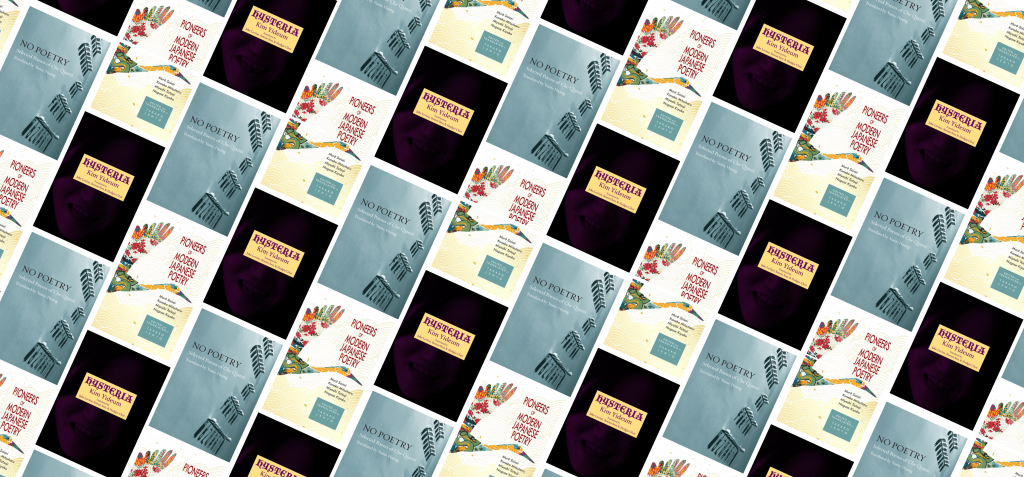
September 16, 2020—The American Literary Translators Association (ALTA) is delighted to announce the shortlist for the 2020 Lucien Stryk Asian Translation Prize. This prize, which was inaugurated in 2009, recognizes the importance of Asian translation for international literature and promotes the translation of Asian works into English. This year’s judges are Noh Anothai, John Balcom, and E. J. Koh.
The award-winning translator for 2020 will receive a $6,000 cash prize, and the award will be announced during ALTA’s annual conference, which this year has gone virtual. The awards ceremony will air on October 15, 2020 on ALTA’s Crowdcast page: you can register to attend Lucien Stryk Asian Translation Prize announcement here.
The 2020 Lucien Stryk Asian Translation Prize Shortlist (in alphabetical order by title):
Hysteria
By Kim Yideum
Translated from the Korean by Jake Levine, Soeun Seo, and Hedgie Choi
(Action Books)
Kim Yideum’s Hysteria, translated by Jake Levine, Soeun Seo, and Hedgie Choi, resists established Korean literary culture in the tradition of Korean feminist poetics. Page by page, Yideum’s poems against rationality, lyricism, and polite society reckon with both political and personal revolutions. Accordingly, the rendering of her poems across languages is multifold as Yideum’s words must be as intentionally irrational as historical oppression. These taut, unsettled poems burst into flames in the hands of the reader, a burning fuse creating a clear path for contemporary Korean women’s poetry.
No Poetry: Selected Poems by Che Qianzi
By Che Qianzi
Translated from the Chinese by Yunte Huang
(Polymorph Editions)
In the poem “Three Basic Colors,” an artist draws three lines in crayon on a blank page: “Three straight lines,” someone (a “big shot”) comments, “Symbolizing three paths”. In response, the artist draws something new: “Failing to understand / (what did he say?) / I drew again, as I liked / Three circles”.
In his collection No Poetry, Che Qianzi displays a similar playfulness with convention (literary, orthographical) and expectation (logical, linear)–as well as with geometric shapes, with the layout of words on the page, with the very form of Chinese ideographs. This bilingual edition allows us to appreciate translator Yunte Huang’s finesse at reflecting these verbal and visual elements in English, allowing to take shape a voice that is delightfully experimental and idiosyncratic. Through Huang’s skill, “no poetry” has not meant “no translation.”
Pioneers of Modern Japanese Poetry
By Muro Saisei, Kaneko Mitsuhara, Miyoshi Tatsuji, and Nagase Kiyoko
Translated from the Japanese by Takako Lento
(Cornell University Press)
Pioneers of Modern Japanese Poetry, edited and translated by Takako Lento, is a superb anthology of four major twentieth-century poets: Muro Saisei, Kaneko Mitsuhara, Miyoshi Tatsuji, and Nagase Kiyoko, who all made significant contributions to the development of modern Japanese poetry. A substantial selection of work by each poet is presented in nuanced, idiomatic translation facing the original Japanese. The translator succeeds in delivering engaging renditions of the four distinct poets, with their diverse themes, voices, and styles–in evoking, in short, the life of the original words. The collection is further enhanced with a general introduction that provides the literary and historical context of the poems, while each poet’s work is smartly staged with a preface on his or her life and career.
You can learn more on Takako Lento’s blog post on Nagase Kiyoko: https://www.cornellpress.cornell.edu/nagase-kiyoko-pioneering-japanese-feminist-and-poet/.
If you’re eager to read these books ahead of the announcement of the winner on October 15, consider buying them from our Bookshop.org list! When you do, you help support ALTA and local bookstores.
